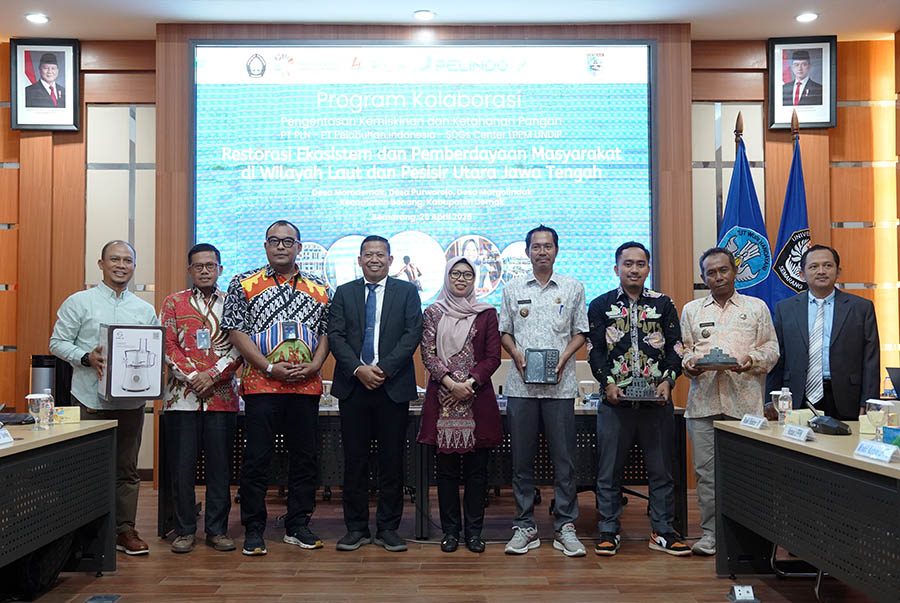UNDIP, Semarang (April 25) – Empowering communities is not just about providing aid but about paving the way toward independence. In this spirit, the SDGs Center of Universitas Diponegoro’s Institute for Research and Community Service (LPPM UNDIP), in collaboration with PT Pelabuhan Indonesia (Pelindo) and PT PLN (Persero), has launched a tangible partnership to transform the coastal potential of Demak Regency into a new force.
Through innovative waste utilization, the program not only contributes to environmental preservation but also drives the local economy—empowering fishermen, women, and coastal youth to become economically independent.
A handover ceremony under the Social and Environmental Responsibility Program (Tanggung Jawab Sosial dan Lingkungan / TJSL), titled “Ecosystem Restoration and Community Empowerment in the Coastal and Marine Areas of Northern Jawa Tengah,” was held in the Rector’s Meeting Room at Universitas Diponegoro. The event served as a concrete manifestation of UNDIP’s commitment to community service, with a special focus on empowering coastal communities in Demak Regency.
In his remarks, UNDIP Rector Prof. Dr. Suharnomo, S.E., M.Si. emphasized the importance of UNDIP’s role in activities that align with the university’s tagline: UNDIP, Noble and Valuable.
“The best institutions are those that bring benefit to society. UNDIP is committed to ensuring that all campus activities extend beyond academic spaces and reach the community,” he stated.
“We can surely lead the way as long as we don’t stop at discourse but truly execute and remain committed,” Prof. Suharnomo added.
He also highlighted the importance of collaboration with strategic institutions such as PLN and Pelindo in building empowered and prosperous communities.
The aid delivered through this program supports the sustainability of both the coastal environment and the local economy. A key highlight, according to Joko Hadi Widayat, Communication and General Manager of PLN UID Jawa Tengah and Yogyakarta, is the utilization of coal combustion ash waste (FABA) in constructing artificial coral reefs. This initiative represents an innovative step in ecosystem preservation while also stimulating the local economy.
“FABA, once considered mere waste, is now a sought-after solution in the field. This finding shows how waste can have extraordinary value when managed properly. Partnerships with academic institutions like UNDIP are key to the success of such programs,” Joko Hadi Widayat explained.
Hardianto, General Manager of Pelindo’s Tanjung Emas Semarang Branch, stated that the collaboration has already shown tangible economic impacts. “We can see the value of this program from its outcomes. Products made from fish waste that used to sell for only IDR 2,500 now reach IDR 10,000. This phenomenon indicates strong sustainability and potential for local economic empowerment,” he said.
The Regent of Demak, Dr. Hj. Eisti’anah, S.E., also attended the event and expressed her appreciation to all parties who have supported community empowerment in Demak Regency.
“The local government cannot work alone. Support from academics and industry is vital to resolving local issues, particularly poverty alleviation and strengthening food security,” Dr. Hj. Eisti’anah said.
She expressed hope that the program would continue and reach more people in need. She also emphasized the importance of UNDIP’s scholarship programs and education as long-term solutions.
Residents from three target villages attended the event. One representative from the beneficiary community expressed heartfelt thanks for UNDIP’s consistent mentoring through self-reliance-based training.
“We didn’t just receive aid—we received continuous guidance. From fishermen to women’s groups and youth organizations, everyone was trained to become self-sufficient and beneficial,” the community representative shared. The community hopes that the support will continue. This initiative stands as clear evidence that accurate community service cannot be carried out in isolation. It requires synergy between academia, industry, and government to create impactful and sustainable programs. (Sani – Media Relations)

